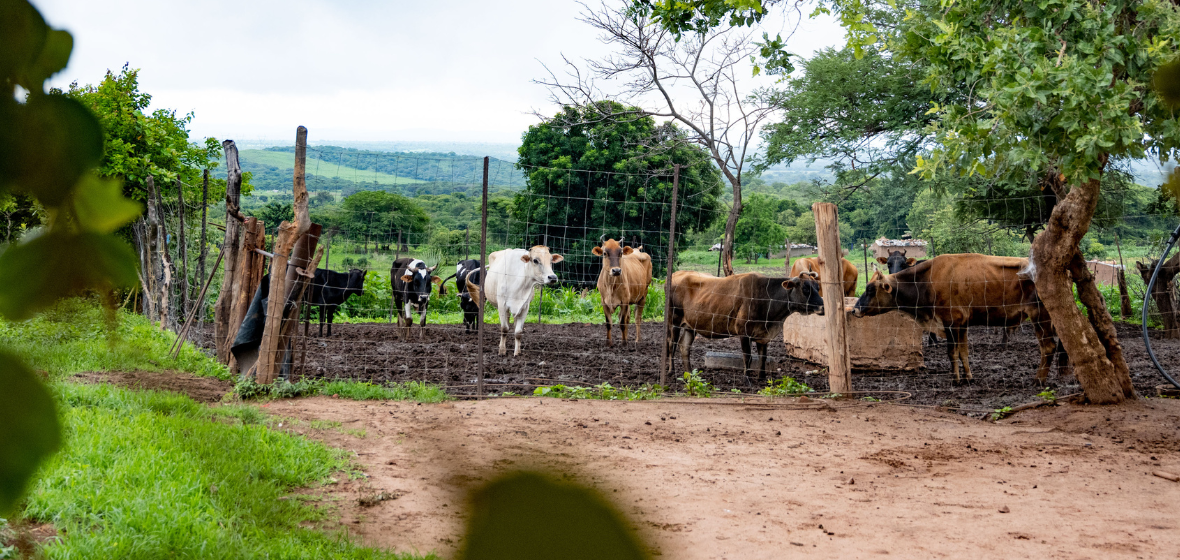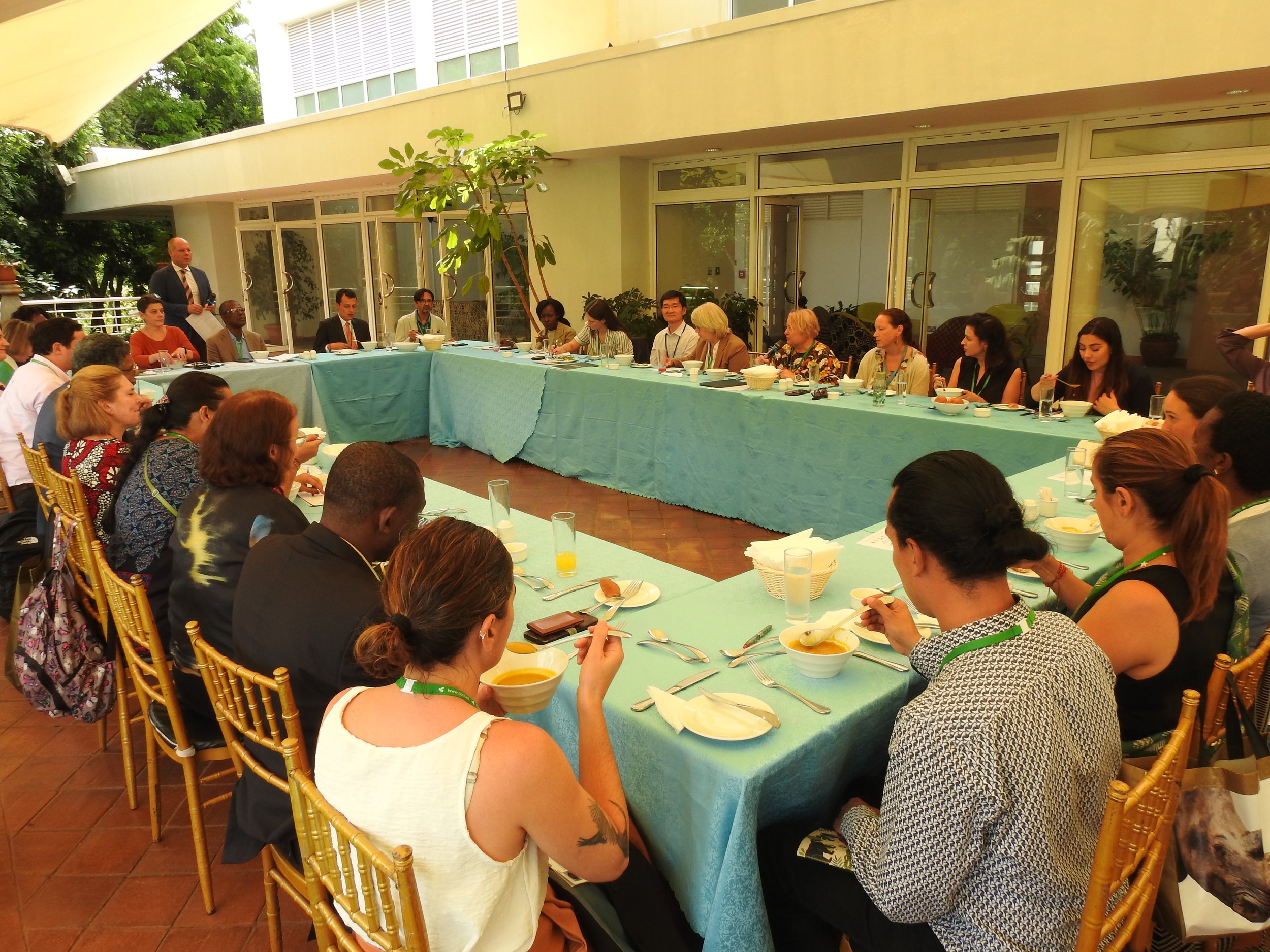
BLOGS, ARTICLES AND NEWS
Get updates directly from the CA4SH Global team and stakeholders
Inaugural Top Agri-food Pioneers (TAP) Cohort Launched
The newly-announced list, published by the World Food Prize Foundation, features 38 changemakers working to improve global food systems.
Among the distinguised cohort is CA4SH Lead and Co-Founder, Dr Leigh Ann Winowiecki! Congratulations, Leigh!
OP-ED | Roots of Resilience: Soil Health and Climate Change?
Soil health is a fundamental component of agricultural sustainability and environmental stewardship. In this article, CA4SH partner Samuel Bamidele explores how enhancing soil health can bolster resilience against the adverse effects of climate change and outlines related legislation from the United States.
Samuel holds a Master of Science from the Department of Plant and Soil Sciences at the University of Delaware. Hailing from Ibadan, Nigeria, Samuel's academic trajectory has been characterized by a profound dedication to soil science and agriculture.
How Healthy Soil Aligns the Three Rio Conventions
Healthy soil is the cornerstone of sustainable development, playing a crucial role in providing ecosystem services, achieving food and nutrition security for all, and climate regulation. Its significance can be underscored through the lens of the three Rio Conventions: the United Nations Framework Convention on Climate Change (UNFCCC), the United Nations Convention to Combat Desertification (UNCCD), and the Convention on Biological Diversity (CBD). Each convention addresses a distinct but interconnected aspect of environmental sustainability, but what remains constant is the critical role that scaling global soil health plays in achieving the objectives of the conventions.
To hone in on soil as a holistic approach to global environmental challenges, we have summarized some of the ways that healthy soil is central to the objectives of the Rio Conventions and outlined some of the key ways forward.
Coffee Krishi Taranga: A Digital Agronomist for Indian Coffee Farmers
Lankala Visweshwara Rao manages his 4-acre arabica coffee farm in Alluri Sitaramaraju district in Andhra Pradesh state in India. He has faced numerous challenges, including the dreaded white stem borer disease, a significant threat in the country’s coffee-growing regions, including Rao’s coffee farm.
Since 2023, Rao has used PxD’s Coffee Krishi Taranga service, a voice-based digital agricultural advisory service, which has provided him with insights and proactive measures to remove and dispose of infected plants in a way that will prevent the spread of larvae. Learn about the other features of the project!
CA4SH at Bonn Climate Change Conference 2024
June 3 to 13, 2024 - The 60th session of the United Nations Framework Convention on Climate Change (UNFCCC) Subsidiaries Bodies (SB60) took place in Bonn, Germany. Also called the 2024 Bonn Climate Change Conference, it brought together an estimated 6,000 attendees to prepare and shape the agenda for COP29 in Baku, Azerbaijan later this year. This year, we contributed to several side events led by partners to elevate the importance of soil health.
June Updates from the CA4SH SteerCo and Partners Meetings
This month, the CA4SH SteerCo met for their third meeting since it’s inception, and the CA4SH Secretariat hosted the second Quarterly Partners Meeting of 2024. With the alignment of the six-month mark of the year, and these two important meetings for strategizing, collaborating, and sharing experiences, this is a great opportunity to reflect on where we are and where we are going for the rest of the year.
Eleven Facts about Soil Carbon with Professor Pete Smith
This is the first in our series of interviews with the LUNZ Soil Health and Carbon Dynamics TAG community, in which we explore the key themes we’ll be working on over the next 40 months.
In this instalment, TAG co-leads Ellen Fay (Sustainable Soils Alliance) and Professor Pete Smith (University of Aberdeen) dig into some of the challenges around soil carbon, including how it relates to soil health, how it is measured, where its greatest opportunities lie and its role in land use change and net zero.
The full interview can be viewed on the LUNZ YouTube channel here, or read on for a summary of the key takeaways.
YPARD’s Involvement in SB60: Championing Young Professionals in Climate Advocacy
From June 3-13, 2024 the 60th session of the Subsidiary Bodies of the United Nations Framework Convention on Climate Change (UNFCCC) was convened in Bonn, Germany. These sessions serve as a crucial mid-year event, laying the groundwork for COP29 in Baku, Azerbaijan. This gathering is an essential platform for young professionals to observe and get involved in negotiations, host and participate in side events to raise important issues, and to amplify youth voices from all over the world.
Read the full story from YPARD
Local Knowledge is Key for Grassland Conservation and Restoration
In Northern Kenya, WWF works with a community-run organisation called Nature and People as One (NaPO) through the Voices for Climate Action programme, which serves as a great example of harnessing the intergenerational knowledge and experience of pastoralist communities. Founded in 2018 by young people from Karare, Marsabit, NaPO works closely with pastoralists to address the challenges they are facing constructively, in order to protect, manage and restore rangelands and the valuable ecosystem services they provide.
Read the full story on the UN Decade of Restoration website
Op-ed: Empowering Refugees and the Vital Role of Community-Led Initiatives in Nakivale
Nakivale refugee settlement was established in 1958 and is the 8th largest refugee settlement in the world, located approximately 200 km away from Kampala, Uganda'. It is one of the oldest refugee settlements in Uganda and contains 79 individual villages.
Recently, food distribution has reduced, creating a food shortage worsened by persistent drought and soil exhaustion. Since 2023, the communities’ needs have outpaced available resources.
Mbilizi Kalombo is a young Congolese refugee living in Nakivale Refugee Settlement. He is the Executive Director and Co-Founder of KYETE BIINGI TAI NYEME - a refugee-led, community-based organization seeking to improve the lives of refugees, including by promoting sustainable soil management practices.
Investing in soils can put countries on a path to land degradation neutrality
Excerpt:
Since the time I began studying soils 25 years ago, we have seen some amazing progress – as well as a collective realization that much more needs to be done to address land degradation and desertification.
Soil is the skin of the Earth. It is now imperative that we raise the public consciousness about soil and make sure its health is on the international agenda.
On 17 June, we observe Desertification and Drought Day to draw awareness to the rapid transformation of land use that has left over 30 percent of the Earth’s terrestrial surface degraded due to unsustainable agriculture and land management practices, deforestation and urban expansion, all of which are exacerbated by climate change.
Read the full story by Dr Leigh Winowiecki on CIFOR Forest News
#UNited4Land: Six soil stewards share their approaches for multi-stakeholder action
The Coalition of Action 4 Soil Health is rooted in the UN Convention to Combat Desertification because of the need for increased global soil health as a major tool to halt desertification, combat drought, and restore land.
The 2024 theme for Desertification and Drought Day (held annually on 17 June), is United for Land: Our Legacy. Our Future, so we asked members of CA4SH to share the relevance of soil health and fighting drought in the context of their organizations, and the role that multi-stakeholder partnerships play in achieving their goals.
Video Blog | Getting your hands dirty! Workshop on soil management by UNEP and ICRAF 🌱
This video blog is from the UNEP YouTube channel
To mark 2024 World Environment Day, the Center for International Forestry Research and World Agroforestry (CIFOR-ICRAF) brought their lab to the UN complex in Nairobi (UNON) to teach the #generationrestoration the basics of soil management and opportunities for restoration.
The workshop on “The pathway to healthy soil management” hosted 40 students from Aga Khan Academy, Lenana School and Kenya High School. Students got their hands dirty learning about different types of soils, causes of land degradation, best practices and nature-based solutions to soil management.
Newly launched Restore4More project seeks to contribute knowledge to guide and scale rangeland restoration in East Africa
“Water and transhumance are often overlooked in restoration research projects. I am very glad that Restore4More will focus on these aspects”, said Peter Minang, Director for Africa at the Centre for International Forestry Research and World Agroforestry (CIFOR-ICRAF). Minang made the welcome remarks at the launch meeting of the Restore4More project held in the CIFOR-ICRAF campus in Nairobi on 15-17 April 2024.
Read the full story from Aida Bargués Tobella for SLU
Hon Penny Wensley Awarded the Distinguished Service Medal at the Centennial Celebration and Congress of the International Union of Soil Sciences (IUSS)
This week, at the Centennial Celebration and Congress of the International Union of Soil Sciences (IUSS) in Florence, Italy, the Honorable Penelope Wensley AC was awarded the Distinguished Service Medal in recognition of her environmental advocacy, diplomacy, and the pursuit of scaling soil health.
Soil health for people and planet: Advancing policy and increasing engagement for a sustainable future
At the recent IUSS Centennial Celebration and Congress held in Florence, Italy, on May 19-21, the British Society of Soil Science (BSSS) hosted a fireside chat focused on the pivotal role of policy in addressing soil degradation and promoting sustainable land management.
CA4SH at the IUSS Centennial Celebration and Congress: Reflecting on successes and looking ahead to the future of soil science
Founded as the International Society of Soil Science (ISSS) on 19th May 1924, the International Union of Soil Scientists (IUSS), with the Italian Soil Science Society (SISS) welcomed more than 1500 scientists from all over the world to Rome, Italy, where the IUSS was founded, to celebrate 100 years of action on soils.
CA4SH Co-Hosted a Roundtable Luncheon on the Side of the CBD SBSTTA26
To bridge actions between the UNFCCC and UNCBD, CA4SH and partners WWF, UNEP, the Alliance of Bioversity and CIAT, CGIAR, CIFOR-ICRAF, Biovision and the New Zealand Ministry of Foreign Affairs and Trade co-hosted a roundtable luncheon on the sidelines of the UNCBD Twenty-sixth meeting of the Subsidiary Body on Scientific, Technical and Technological Advice (STTA26). The luncheon was called Food Systems Transformation & Land Use Change: Unlocking the potential for enhanced synergies and finance through NBSPAs and NDCs, where attendees joined a group discussion on how aligning the UNFCCC and UNCBD could unlock and enhance synergies and scale-up financial support at the national level to enable food systems transformation.
Chhattisgarh Case Study: Healthy soil miraculously boosts chilli crops
In 2018, a village in Chhattisgarh, India struggled to meet market demands for chillies due to low yields and a short growing period. The villagers turned to Cownomics® Technology from Vaidic Srijan, an approach rooted in traditional Indian Vedic sciences that balances the health of soil, water and air for greater overall cohesion on the farm. Farmers were taken aback by how quickly they saw their crops respond.
Story and photos from Madhukar Swayambhu, Founder & Research Head, Vaidic Srijan LLP, a member of CA4SH from Bharat (India)
CA4SH Science Webinar: Harnessing science & knowledge to scale monitoring and actionable data
CA4SH’s Webinar Series was held over three sessions in the lead-up to the Africa Fertilizer and Soil Health Summit to address key challenges currently constraining farmers to implement healthy soil practices. The first two sessions were held under the topics of bringing soil health into policy and financing healthy soil practices. This third session focused on the science and knowledge needed to generate actionable data for soil health monitoring and scaling up, informing and tracking soil health practices on the ground whilst addressing key barriers.




















